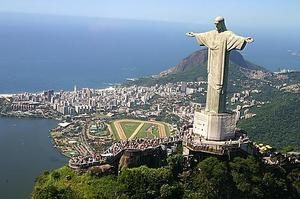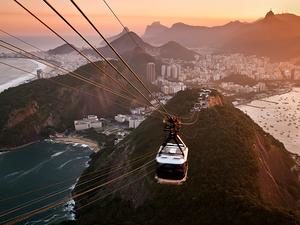Ah, Rio. One of my favorite cities on earth, and certainly one of the most beautiful.
Sugar Loaf Mountain… the golden beaches of Copacabana and Ipanema…the panoramic views from Corcovado (site of Christ the Redeemer statue)…Carnival…samba…churrascaria retaurants (all the meat you can eat!)….caipirinhas (Brazil’s delicious national cocktail, made of cachaca, sugar and lime)…the Cariocas (Rio natives) themselves, some of the world’s most sensuous people.
These are all images that will become familiar during the 2016 Summer Olympics in Rio, which run August 5 to 21.
Perhaps less publicized will be the images of Rio’s sprawling slums (favelas), of toxic polluted waterways (including some Olympic venues), of shoddy workmanship in the Olympic Village (the accommodations for the Australian team have already caught fire due to faulty wiring), and — less outwardly visible but no less significant — the $12 billion and counting spent by the government to stage the games, money that could have been used to improve the health care, education and environmental conditions of Rio’s poorest residents.
Not to mention the threat of mosquitoes carrying the Zika virus. And security threats as well: Like just about all baby boomers, I remember all too well the tragedies of Munich and Atlanta.
From Celebration to Remorse
When Rio was named host city for these games back in 2009, it was a cause for celebration in Brazil: Rio was the first city in South America to win such an honor.
But as has been the case with many Olympics in the past few decades, cost overruns, construction delays, and, no doubt, corruption at high levels have plagued Rio’s preparations and called into question the city’s ability to stage such a huge event.
And surveys have shown that most Cariocas now wish the Olympics would just go away.
I have no doubt that the games will go on, complete with marvelous performances, gaudy or grand opening and closing ceremonies, and perhaps some minor hiccups or even major disasters — you just never know.
The world will also get to see the stunning beauty of the terrain and get to learn more about the charms of the local culture as well.
And at least some of that $12 billion has gone into much needed public transportation and infrastructure improvements that will benefit many Rio residents, including the working poor.
As for attracting more tourists, that remains to be seen.
Brazil is currently besieged by political turmoil and serious health issues (led by Zika), while Rio has acquired a reputation as a high crime zone and a poster child for social inequality, a jarring juxtaposition of wealth and poverty.
If the Olympics calls more attention to these problems, it could hurt tourism. If images of Sugar Loaf and Copacabana predominate, it could help.
Just to make it clear, I love Rio and, after three visits there, would go back in a minute. I also enjoy watching the Olympics.
The Larger Issue
But the larger issue is whether or not the Olympic Games should continue to be awarded to a variety of cities around the world — not just to cities that can’t possibly afford to take on these cash sinkholes, but to even the wealthiest cities and countries.
Too often, they’re used to showcase boondoggles like the $55 billion 2014 Sochi Winter Games, essentially staged to enrich and glorify Vladimir Putin.
Having recently returned from Greece, beset with its own economic problems (and still reeling from the costs of the 2004 Summer Olympics in Athens, where much of the Olympic venues lie in ruins), I would still join the rising chorus of those calling for one permanent host city: namely Olympia, Greece, site of the original 8th century BC Olympic Games.
Mountainous Greece might prove suitable for hosting the Winter Olympics as well.
Every Olympic nation — some 200 of them — could pitch in what they can afford (perhaps based on the average size of their teams) to pay for construction and upkeep of the venues.
If the games run a profit, money could be returned to individual Olympic committees. If they run a deficit (unlikely), participating countries would pony up.
In any event, Greece — which originated the whole idea — would benefit from the added tourism. And we could forget all the stories every two or four years about such and such a city going disastrously into debt to build huge stadiums and other facilities that are often never used again.
It’s just common sense, which probably means it will never happen — unless, a few years from now, no bidders come forward to host the games. Then Olympia might get the call.















Leave a Reply